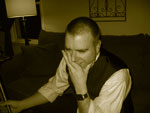(Un)Suited
Michael Dean Clark
 A week ago, I wore a suit to work. And a tie. And a vest.
A week ago, I wore a suit to work. And a tie. And a vest.
This is not cause for alarm, except for some of my new students who felt compelled ask why I’d done it. Backing up a bit, there are three cultural assumptions at work here.
First: Writers don’t look like “writers” unless their outfit was picked up off the bedroom floor, shaken out, and put on quickly enough that one of the buttons in the shirt is in the wrong hole (if the shirt has all of its buttons to begin with).
Second: People who just completed a Ph.D. don’t have enough money to own a suit that makes them look like they could be a teller at the local Bank of America branch.
Third: Being that my new university sits right on the Pacific Ocean, I should apparently deliver my lectures in shorts, sandals, and with a liberal use of the term “dude.”
The intersection of all these ideas is exactly why I wear the suit. Call it a fashionable object lesson.
The more I write and the more I work with other writers, the more convinced I am that the greatest obstacle standing in the way of originality is not our practice of making cultural assumptions and then extending those assumptions into stereotypes. Rather, the problem lies in our inability to identify those assumptive forces within ourselves. In writing, this is deadly.
I know, this isn’t rocket science. Then again, the rocket scientists I’ve known more often than not suffer from the same blindness.
We can’t see within ourselves the systems that guide our opinions and actions when we decide what is and is not acceptable, desirable, and worth pursuing. And when we can’t see them, we can’t challenge them.
In critical theory, folks like Foucault would point to our blind spot for the control of systems outside of us as the culprits for this blindness. We are enmeshed in overlapping, intertwined mechanisms that create the internal latticework of opinions and attitudes that “guide” us.
I tend to see humans as more autonomous than that, but I’m not as smart as Michel was. And yet, I’m pretty sure his ability to theorize about those systems (and my subsequent assumption that they are there) means I can’t lay back and blame everything outside of me for my internal blind spots.
If I’m going to be a writer, I must identify and own the places where I lack sight. Not only that, I need to wallow in them and then make them public. This is the mirror artists hold up to culture. And a mirror is only effective if it reflects clearly (unless you want to avoid your blemishes, in which case I’d suggest taking stock in why you are so afraid of yourself).
So sometimes I wear a suit. That way, when people’s stereotypes are challenged, I can talk about it with them. Hopefully those conversations will lead me and others to a more refined understanding of the forces at work within us and a broader vocabulary with which to talk about them.
Michael Dean Clark is a writer, teacher, and former Southern California ex-patriot in the Midwest. Currently, he is at work on…nothing. His new job as a professor of writing at Point Loma Nazarene University has left no time for stories of his own. He hopes that is not the case for much longer, otherwise people may begin to question his qualifications for said new job.